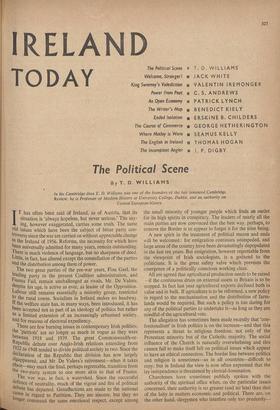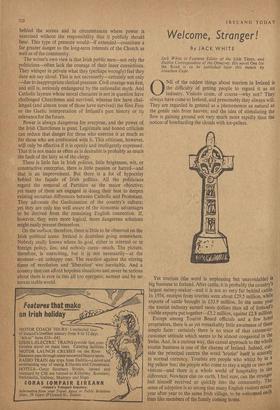IRELAND
TODAY
The Political Scene Welcome, Stranger! u King Sweeney's Valediction Power from Peat An Open Economy The Writer's Mop Ended Isolation The Course of Commerce Where Motley is Worn The English In Ireland The Incompleat Angler
■
I,
st
T. D. WILLIAMS JACK WHITE VALENTIN IREMONGER C. S. ANDREWS PATRICK LYNCH BENEDICT KIELY ERS.KINE B. CHILDERS GEORGE HETHERINGTON SEAMUS KELLY THOMAS HOGAN U J. J.P. DIGBY
The Political Scene
By T. D. WILLIAMS
In his Cambridge days T. D. Williams was one of the founders of the late lamented Cambridge Review: he is Professor of Modern History at University College, Dublin, and an authority on Central European history.
IT has often been said of Ireland, as of Austria, that its situation is 'always hopeless, but never serious.' The say- ing, however exaggerated, carries some truth. The same old issues which have been the subject of bitter party con- !roversy since the war are carried on without appreciable change In the Ireland of 1956. Reforms, the necessity for which have been universally admitted for many years, remain outstanding. There is much violence of language, but no sharpness of deed. Little, in fact, has altered except the constellation of the parties and the distribution among them of power. The two great parties of the pre-war years, Fine Gael, the leading party in the present Coalition administration, and Fianna Fail, remain unchallenged as rivals, Mr. De Valera. despite his age, is active as ever, as leader of the Opposition. Labour still remains essentially a minority group, restricted to the rural towns. Socialism in Ireland makes no headway. If the welfare state has, in many ways, been introduced, it has been accepted not as part of an ideology of politics but rather as a limited extension of an increasingly urbanised society, and for reasons of electoral expediency. There are few burning issues in contemporary Irish politics; the `patriots' are no longer as much in vogue as they were between 1918 and 1939. The great Commonwealth-or- Republic debate over Anglo-Irish relations extending from 1922 to 1948 tended to divide political society in two. Since the declaration of the Republic that division has now largely dlappeared; and Mr. De Valera's retirement—when it takes Place—may mark the final, perhaps regrettable, transition from the two-party system to one more akin to that of France. The war was, in fact, a watershed. Since the successful defence of neutrality, much of the vigour and fire of political debate has departed. Genuflections. are made to the national cause in regard to Partition. They are sincere; but they no longer command the same emotional respect, except among the small minority of younger people which finds an outlet for its high spirits in conspiracy. The leaders of nearly all the main parties are now convinced that the best way, perhaps, to remove the Border is to appear to forget it for the time being.
A new spirit in the treatment of political means and ends will be welcomed : for emigration continues unimpeded, and large areas of the country have been devastatingly depopulated in the last ten years. But emigration, however regrettable from the viewpoint of Irish sociologists, is a godsend to the politicians. It is the great, safety valve which prevents the emergence of a politically conscious working class.
All are agreed that agricultural production needs to be raised - if the continuous drain on external assets in Britain is to be stopped. In fact last year agricultural exports declined both in value and in bulk. If agriculture is to be reformed, a new policy in regard to the mechanisation and the distribution of farm- lands would be required. But such a policy is too daring for any of the political parties to undertake it—as long as they are mindful of the agricultural vote.
The allegation has sometimes been made recently that 'con- fessionalise in Irish politics is on the increase—and that this represents a threat to religious freedom, not only of the, Protestant minority but of the Catholic majority. The social influence of the Church is naturally overwhelming and this cannot fail to make itself felt on political issues which appear to have an ethical connection. The border line between politics and religion is sometimes—as in all countries—difficult to espy; but in Ireland the view is now often expressed that the lay independence is threatened by clerical domination.
Churchmen have sometimes publicly spoken with the authority of the spiritual office when, on the particular issues concerned, their authority is no greater (and no-less) than that of the laity in matters economic and political. There are, on the other hand, clergymen who interfere only too prudently- behind the scenes and in circumstances where power is exercised without the responsibility that it publicly should bear. This type of pressure would—if extended—constitute a far greater danger to the long-term interests of the Church as well as of the community.
The writer's own view is that Irish public men—not only the politicians—often lack the courage of their inner convictions. They whisper in private what they (perhaps wrongly) feel they dare not say aloud. This is not necessarily—certainly not only —due to inappropriate clerical pressure. Civil courage was first, and still is, seriously endangered by the nationalist myth. And Catholic laymen whose moral character is not in question have , challenged Churchmen and survived, whereas few have chal- lenged (and almost none of those have survived) the Sinn Fein or the Gaelic interpretation of Ireland's past history or its relevance for the future.
Power is always dangerous for everyone, and the power of. the Irish Churchmen is great. Legitimate and honest criticism can reduce that danger for those who exercise it as much as for those who are confronted with it. This criticism, however, will only be effective if it is openly and intelligently expressed. That it is not made as often as is desirable is probably as much tilt fault of the laity as of the clergy.
There is little fun in Irish politics, little brightness, wit, or constructive enterprise, there is little passion or hatred—and that is an improvement. But there is a lot of hypocrisy behind the façade of Irish politics. All the politicians regard the removal of Partition as the major objective; yet many of them are engaged in doing their best to deepen existing sectarian differences between Catholic and Protestant. They advocate the Gaelicisation of the country's culture; yet they are only too well aware of the economic advantages to be derived from the remaining English connection. If, however, they were more logical, more dangerous solutions might easily present themselves.
On the surface, therefore, there is little to be observed on the Irish political scene. Ireland is doubtless going somewhere. Nobody really knows where its goal, either in internal or in foreign policy, lies; and nobody cares—muchd The picture, therefore, is unexciting, but it is not necessarily—at the moment—an unhappy one. The reaction against the stirring times of revolution and 'liberation' was inevitable. And a country that can afford hopeless situations and never be serious about them is rare in this all too energetic, earnest and by no means stable world.



















































 Previous page
Previous page